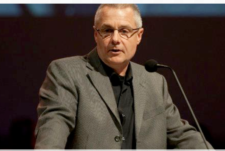Pastor Sees Immigrants Through Lens of Bible — and the Economy
Date: April 25, 2017
Dr. Carl Ruby, a conservative Christian pastor at Central Christian Church in Springfield, Ohio, believes that immigration reform is a civil rights issue. It was a lesson he learned decades ago, when he first read Martin Luther King Jr.’s “Letter from Birmingham Jail.” “I saw that it was an issue that white, conservative Christians should be tackling,” he says.

After nearly three decades as an administrator and dean at Cedarville University, he joined the National Immigration Forum, an advocacy group, in 2013. There, he led Bibles, Badges, and Business, a three-state initiative that brings together conservative clergy, law enforcement, and local businesses to formulate policy recommendations around immigration reform. All suggestions, according to Dr. Ruby, are meant to emphasize compassion and the rule of law as well as economic development. “Churches, the police, and local business owners are in a position to really see the changes within their communities and to see the driving forces behind those changes,” he says.
“We are a nation of immigrants and always have been. We need to recognize that they are an asset, not a liability.
Through this work, Dr. Ruby began to take greater notice of Springfield’s immigrant population, including the growing number of Latinos working at the local Walmart and on the area’s dairy farms. He realized that they brought both cultural and economic value to the region.
According to New American Economy, immigrants account for just 3.5 percent of the population in Ohio’s Eighth Congressional District, where Springfield is located, but they yield spending power of $564.5 million. They are also helping to shore up a region suffering from population decline. In 2017, local news sources reported that the Springfield population has declined to its lowest in 50 years, with an average of 500 people leaving every year in search of better opportunities.
Dr. Ruby realized that immigrants could do even more to help revitalize the local economy. So he approached the city council, which unanimously approved a resolution calling for the city to promote the inclusion of immigrants. The resulting initiative, Welcome Springfield, offers three key services: free ESL classes; community education; and advocacy services to help the county attract and serve immigrants and the businesses that employ them. Welcome Springfield is a partnership with the national organization Welcoming America, an umbrella of nearly 100 Welcoming cities across the country. “The community has received us very well,” says Dr. Ruby. “We have a lot of local support.”
Dr. Ruby also works with the Evangelical Immigration Table, a nationwide coalition of evangelical organizations that believes immigration reform is consistent with biblical values. “It is about practicing what Christ taught,” he says, like welcoming the stranger. “We have also found that the more a person attends church, the more their support and understanding of the issue grows.” And so at Central Christian Church, where he serves as senior pastor, he often preaches about the link between immigration reform and civil rights. His church also partners with a local Spanish-speaking congregation to help immigrant members feel welcome.
Dr. Ruby often hears people say that the current immigration laws must be enforced before reform can happen. He argues differently. “If we enforce the current rules, one of Springfield’s largest employers” — a Dole food processing plant — “would immediately go out of business, because they would lose their labor force,” he says.
Dr. Ruby would like to see the system modernized, with waiting times shortened for visas and status adjustments. “It should not take several years for approval to come to the United States,” he says. But the key question that Dr. Ruby believes should shape immigration reform is this: “How many immigrants do we need for our economy to function at its very best?”
“We are a nation of immigrants and always have been,” he says. “We need to recognize that they are an asset, not a liability.”
